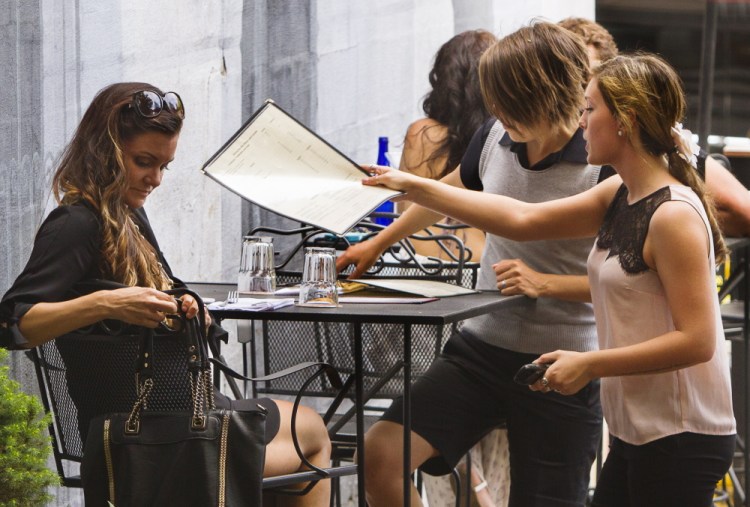In enacting a citywide minimum wage Monday night, the Portland City Council didn’t realize the ordinance will force city business owners to nearly double what they pay employees who receive tips.
The consequences of the gaffe caught Portland Mayor Michael Brennan by surprise on Tuesday even though he and other city officials who supported the citywide minimum wage had stated repeatedly that they didn’t intend to increase what employers would have to pay tipped workers such as food servers, bartenders and valets out of concern it would hurt the city’s tourism industry.
But because of a state law allowing employers a credit toward the minimum wage for tipped workers, city businesses will have to increase what they pay such employees from the $3.75 an hour they were paid under the state’s minimum wage to no less than $6.35 an hour as of Jan. 1.
“That’s never been part of the discussions we’ve had,” Brennan said in an interview Tuesday with the Portland Press Herald. “It was very clear that we weren’t trying to move toward increasing the financial impact on restaurants.”
The council voted 6-3 Monday night to create a citywide minimum wage of $10.10 an hour on Jan. 1, increase it to $10.68 a year later, and tie future minimum wages to inflation. Brennan has been pushing for such an ordinance since he vowed to increase the minimum wage during his 2014 State of the City speech.
Its passage made Portland the first city to set its own minimum wage in Maine, where the statewide minimum is $7.50 an hour.
The mayor said Tuesday that he believed the ordinance left employers’ required hourly payment to tipped workers at the current rate.
“The intent was that we stayed with state law at $3.75,” Brennan said.
That is not the case.
As written, the ordinance will raise the minimum hourly wage for tipped employees in Portland to $6.35 as of Jan. 1. A year later, the hourly wage for tipped employees will jump to $6.93. It will increase again each year based on inflation.
City spokeswoman Jessica Grondin confirmed in an email Tuesday that the ordinance raises the minimum wage for tipped workers.
“What I’m told is that the state law minimum wage credit of $3.75 (an hour) would apply to the city’s new minimum wage and that the remainder would be the wage covered by a given employer,” Grondin wrote. “So employers would pay tipped workers $6.35 (an hour).”
MAINE’S TIP CREDIT: $3.75
Grondin was referring to the $3.75 tip credit, which is the maximum amount state law allows employers to subtract from the hourly minimum they otherwise would have to pay a tipped employee. The idea is that since the employee is earning tips, the employer doesn’t have to pay the full minimum. All but seven states have tip credits.
If an employee does not earn enough in tips during a work week to meet or exceed the minimum wage, the employer must make up the difference.
In Maine, state law allows employers a maximum tip credit of half the state’s $7.50 minimum wage, or $3.75. Portland’s minimum wage ordinance references the state law under the section on tipped employees.
“As provided in 26 (Maine Revised Statutes) §664(2), an Employer may consider tips as part of the wages of a Tipped Employee toward satisfaction of the Minimum Wage established by this ordinance, but such a tip credit may not exceed the amount established in (the state law),” the ordinance says.
Based on that language, beginning in January, Portland business owners will have to pay their tipped employees at least $6.35 an hour: $10.10 an hour minus the maximum tip credit of $3.75 outlined in the state law.
Calls to several Portland restaurant owners for comment on the city’s minimum wage weren’t returned on Tuesday.
THERE’S TIME TO MAKE A FIX
The interview with Brennan on Tuesday made it clear that he did not fully understand the tip credit concept, despite what the mayor said were months of discussions with advisers and the city’s corporate counsel. Brennan believed the city’s minimum wage ordinance would leave employer obligations to tipped workers unchanged.
“We thought we had been following sound legal advice,” he said, adding that there is time to amend the ordinance if necessary. “We have six months before this goes into effect.”
Brennan went on to ask a reporter for advice on how to fix the problem.
“I’m in the uncomfortable position of talking to a reporter who knows more about this issue than I do,” he said.
Keeping the city’s higher minimum wage without requiring businesses to pay tipped employees more money may be difficult to do without running afoul of state law or creating an unfair environment for workers, a state official said.
One way would be to have two minimum wages, a lower one for tipped workers and a higher one for everyone else, said Julie Rabinowitz, spokeswoman for the Maine Department of Labor.
For instance, the city could leave the minimum wage at $7.50 an hour for tipped workers while increasing it to $10.10 as planned for all others. Under that scenario, employers could continue to pay tipped workers as little as $3.75 an hour without exceeding the state’s maximum allowable tip credit.
The problem, Rabinowitz said, is that a tipped worker who had a bad week would only be eligible for compensation of up to $7.50 an hour, and not $10.10 an hour like everyone else.
About 40 percent of those earning minimum wage in Portland are tipped workers, Rabinowitz said, so a minimum wage increase that didn’t include them would be inherently unfair.
“You’re exempting almost half of the people who are making minimum wage,” she said.
Send questions/comments to the editors.






Success. Please wait for the page to reload. If the page does not reload within 5 seconds, please refresh the page.
Enter your email and password to access comments.
Hi, to comment on stories you must . This profile is in addition to your subscription and website login.
Already have a commenting profile? .
Invalid username/password.
Please check your email to confirm and complete your registration.
Only subscribers are eligible to post comments. Please subscribe or login first for digital access. Here’s why.
Use the form below to reset your password. When you've submitted your account email, we will send an email with a reset code.